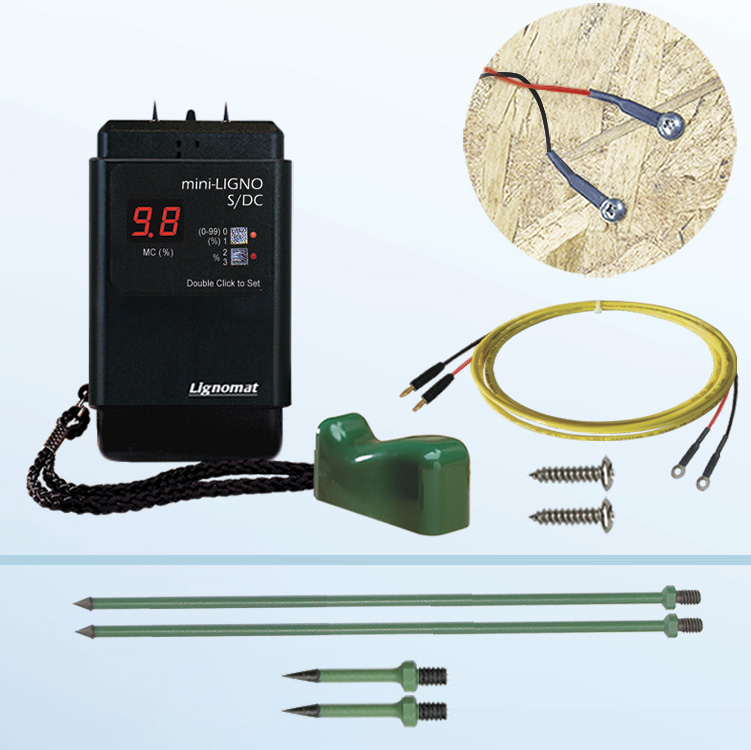The Ultimate Guide to Picking the Right Moisture Meter for Your Requirements
Wiki Article
The Ultimate Overview to Moisture Meters: A Comprehensive Introduction and Exactly How They Can Save You Money
Moisture meters offer as crucial tools in identifying and keeping track of moisture web content in products, aiding in protecting against expensive problems and ensuring the quality of products. Comprehending the subtleties of different types of wetness meters, their applications, and the possible cost-saving advantages they offer can be a game-changer for specialists and companies alike.Kinds Of Dampness Meters
One typical type is the pin-type wetness meter, which determines the electrical resistance between 2 pins placed into a material. Pinless dampness meters, on the other hand, use electro-magnetic sensor plates to scan a bigger location without triggering damage to the material's surface area.
Infrared wetness meters gauge the thermal residential or commercial properties of a material to identify its moisture content non-invasively, making them helpful for applications where pin or pinless meters might not be ideal. Understanding the different kinds of wetness meters available can help markets choose the most ideal tool for their certain wetness measurement needs.

Benefits of Making Use Of Moisture Meters
Wetness meters supply indispensable advantages in precisely examining and checking dampness degrees in diverse materials and settings. One of the main advantages of utilizing wetness meters is the prevention of potential damage triggered by excess moisture.
Moreover, making use of wetness meters can lead to increased energy performance. In agricultural settings, moisture meters play a critical duty in enhancing crop returns by allowing farmers to monitor soil wetness degrees and make notified irrigation decisions.
How to Pick the Right Moisture Meter
Selecting the proper dampness meter includes taking into consideration crucial factors such as product compatibility, measurement array, and calibration accuracy. When selecting a dampness meter, it's crucial to make certain that the meter appropriates for the specific material you will certainly be testing. Different products have varying electric properties that can influence moisture readings, so picking a meter designed for your material is critical for exact outcomes. Additionally, take into consideration the measurement series of the wetness meter. Make certain that the meter can detect moisture levels within the variety required for your applications. Calibration precision is an additional critical factor to bear in mind. Select a moisture meter with trustworthy calibration to make sure exact and constant readings. Some meters may need regular calibration modifications, so comprehending the calibration process is very important. By carefully examining these aspects, you can select a wetness meter that meets your needs and gives precise wetness measurements for your projects.Correct Techniques for Dampness Meter Usage

Cost Financial Savings Via Dampness Meter Applications
How can the critical usage of moisture meters bring about substantial price savings throughout numerous industries? Moisture meters play an essential role in price financial savings by stopping prospective damages and ensuring quality control in various fields. In the agriculture industry, dampness meters aid in figuring out the optimal time for gathering crops, protecting against excess or over-drying moisture that can influence the end product's top quality. This precise surveillance assists farmers avoid unneeded losses and maximize their return.
Likewise, in building and construction, wetness meters aid avoid pricey problems by discovering moisture levels in structure materials, such as wood or concrete, which can bring about structural problems otherwise dealt with quickly. By identifying trouble areas beforehand, specialists can take corrective actions to prevent substantial repair services or replacements, inevitably saving money and time.
In addition, in the food processing industry, moisture meters are important for keeping an eye on item top quality and ensuring conformity with safety and security regulations. By precisely measuring wetness material in food items, manufacturers can prevent wasting, keep freshness, and lower waste, resulting in substantial price financial savings. On the whole, the tactical application of wetness meters is an important financial investment that can bring about significant cost click reference reductions and enhanced efficiency throughout different markets.
Verdict
In verdict, wetness meters are important devices for identifying and measuring wetness levels in different materials. By using the appropriate moisture meter and complying with appropriate strategies, users can properly avoid pricey damages triggered by excess dampness. Investing in a high quality dampness meter can bring about considerable cost savings in the future by determining possible issues beforehand and allowing punctual removal. Inevitably, dampness meters are important instruments for preserving the stability and durability of products and structures.Wetness meters serve as essential devices in spotting why not try this out and keeping track of moisture content in products, helping in avoiding costly damages and making certain the quality of items. Infrared wetness meters determine the thermal residential or commercial properties of a material to identify its wetness content non-invasively, making them beneficial for applications where pin or pinless meters might not be ideal.Wetness meters supply invaluable advantages in properly monitoring and analyzing wetness degrees in varied materials and settings. In farming settings, dampness meters play an important duty in maximizing crop yields by enabling farmers to monitor dirt moisture degrees and make notified irrigation decisions.In conclusion, dampness meters are important tools for detecting and measuring dampness degrees in different products.
Report this wiki page